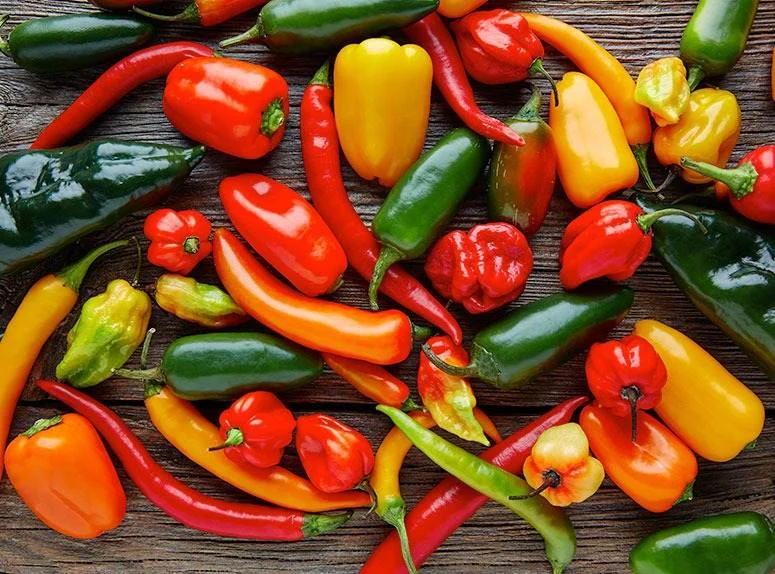Five Secrets to Boosting Your Pepper Plant Productivity
Growing peppers can be a fulfilling gardening adventure, but to achieve the fastest growth and the biggest, most flavorful fruits, you’ll need a bit of expertise. Here are five secrets to help you maximize your pepper plants’ productivity and ensure a bountiful harvest.
1. Start with Healthy Soil
Soil Quality: Peppers flourish in well-draining, nutrient-rich soil. Before planting, enrich your soil with organic matter such as compost or well-rotted manure. This improves soil structure and provides essential nutrients for healthy root development.
pH Level: Peppers prefer a slightly acidic to neutral soil pH, ideally between 6.0 and 7.0. Test your soil and adjust the pH if necessary. Lime can raise the pH, while sulfur can lower it.
Fertilization: At planting, incorporate a balanced, slow-release fertilizer into the soil. As your plants grow, switch to a fertilizer higher in phosphorus and potassium to support blooming and fruiting.
2. Warm Up the Soil
Soil Temperature: Peppers need warm soil to thrive. Aim to plant them when the soil temperature is consistently above 70°F (21°C). Cooler soil can slow growth and delay fruiting.
Pre-Warming Techniques: In cooler climates, use black plastic mulch or dark-colored landscape fabric to absorb heat from the sun and warm the soil. Cover the planting area with cloches or row covers to trap heat.
Timing: Start pepper seeds indoors 8-10 weeks before the last expected frost. This gives the plants a head start, ensuring they are strong enough to thrive when outdoor conditions are ideal.
3. Water Wisely
Consistent Moisture: Peppers need consistent moisture but dislike being waterlogged. Water deeply but infrequently, allowing the top inch of soil to dry out between waterings. This promotes deeper root growth.
Avoid Overhead Watering: Water at the base of the plants to prevent fungal diseases. Drip irrigation or soaker hoses are effective for delivering water directly to the roots.
Mulching: Apply organic mulch like straw or shredded leaves around your pepper plants. Mulch helps retain soil moisture, regulate temperature, and reduce weed competition.
4. Prune and Support Your Plants
Pruning: Regular pruning improves air circulation and reduces disease risk. Pinch off early flowers to focus the plant’s energy on growth. Remove suckers (small shoots between the main stem and branches) to direct more energy to the main branches.
Staking and Caging: Support your plants with stakes, cages, or trellises to prevent them from bending or breaking under the weight of the fruit. Keeping the fruit off the ground reduces the risk of rot.
5. Optimize Sunlight and Heat
Full Sun: Peppers need at least 6-8 hours of direct sunlight each day for optimal growth. If growing indoors or in a greenhouse, use grow lights to supplement natural light.
Heat Management: While peppers love warmth, extreme heat can stress them. In hot climates, provide afternoon shade using shade cloth or taller plants to protect from scorching.
Container Growing: If growing peppers in containers, place them in the sunniest, warmest spots during the day. Containers can heat up faster than garden soil, which is beneficial in cooler climates.
Bonus Tips: Companion Planting and Pest Management
Companion Planting: Grow peppers alongside basil, oregano, or marigolds to repel pests and enhance flavor. Avoid planting near fennel or kohlrabi, which can inhibit pepper growth.
Pest Control: Watch for pests like aphids, spider mites, and whiteflies. Introduce beneficial insects such as ladybugs or use organic insecticidal soap to manage infestations. Regularly inspect and hand-remove pests if needed.
Conclusion
By implementing these five secrets, you can grow peppers that are faster, larger, and more flavorful. With the right soil, proper watering, effective pruning, and optimal sunlight, your pepper plants will reward you with an impressive harvest. Whether you’re cultivating them in a garden or containers, these tips will help you achieve pepper-growing success.

